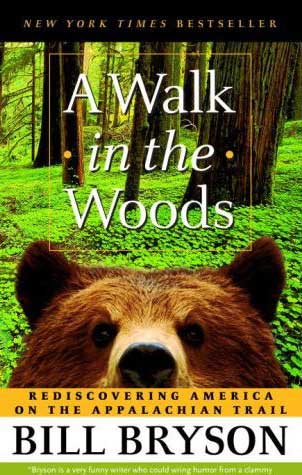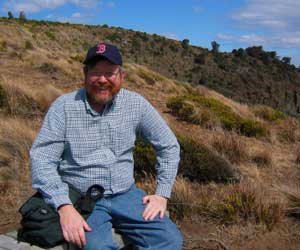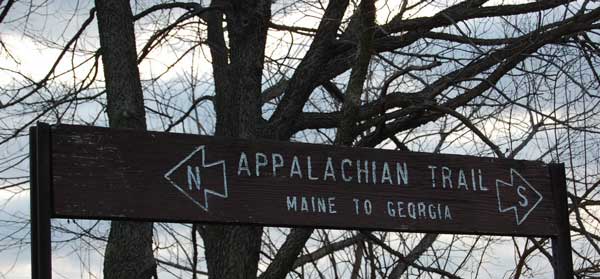Why, then, is it that so many outdoor enthusiasts love the writings of two dopey, naïve men trudging through the Appalachians?
 Be it Jon Krakauer’s Into the Wild or Thoreau’s Walden, extreme lovers of the outdoors enjoy the enchantment and thrill of true adventure novels. Men or women venture out into the deep wilderness, test their strengths, and encounter a series of life or death incidents that get our hearts beating as we read. Mountains are climbed in extreme conditions, food becomes sparse, and individuals or teams must work together in order to truly survive in extreme conditions. Why, then, is it that so many outdoor enthusiasts love the writings of two dopey, naïve men trudging through the Appalachians?
Be it Jon Krakauer’s Into the Wild or Thoreau’s Walden, extreme lovers of the outdoors enjoy the enchantment and thrill of true adventure novels. Men or women venture out into the deep wilderness, test their strengths, and encounter a series of life or death incidents that get our hearts beating as we read. Mountains are climbed in extreme conditions, food becomes sparse, and individuals or teams must work together in order to truly survive in extreme conditions. Why, then, is it that so many outdoor enthusiasts love the writings of two dopey, naïve men trudging through the Appalachians?
Author Bill Bryson has written several novels on the business and art of travel, exploring the depths of Australia or the roots of his European heritage. He comes in to his novels with a notion of experience, culture, and an air of confidence in taking on the adventures that lay before him. One of his most popular stories, A Walk in the Woods, describes a much different journey in comparison to his usual jaunts: the great Appalachian Trail (AT), a 2,200 mile journey from Maine to Georgia. This trail was a beast, though, that not even Bill Bryson was ready to attack.
Contrary to his past writing experiences, no air of confidence could be discerned through the heavy breaths and groaning remarks laced throughout the novel’s entirety. An ex-pat from Britain having moved to New England, Bryson would venture through his backyard often, taking a walk in the woods, if you will. Feeling overwhelmed and inspired by the nature that lived around him, he found within himself the impetus to start a journey that only a couple thousand people venture each year to even begin. Mildly overweight and inexperienced at hiking, the AT became the kick back into shape and wilderness adventure that he was seeking in his life, as he so romantically viewed it.
 With the help, or hindrance, of childhood friend Stephen Katz, the two men find their way down south to Springer Mountain, Georgia, where therein lies the start of the AT. In a taxi on the way to their initial trailhead, the driver beings to tell stories of hikers, past and present, who began their journeys with the same wild-eyed excitement… only to quit early on in their quest. Their initial journeys seem as ominous as the hikers their taxi driver had described to them; staggering through the bitter cold conditions, Bryson and Katz seem like two drunkards stumbling through the trails of Georgia, losing track of one another and stopping to throw items from their backpacks deemed too heavy.
With the help, or hindrance, of childhood friend Stephen Katz, the two men find their way down south to Springer Mountain, Georgia, where therein lies the start of the AT. In a taxi on the way to their initial trailhead, the driver beings to tell stories of hikers, past and present, who began their journeys with the same wild-eyed excitement… only to quit early on in their quest. Their initial journeys seem as ominous as the hikers their taxi driver had described to them; staggering through the bitter cold conditions, Bryson and Katz seem like two drunkards stumbling through the trails of Georgia, losing track of one another and stopping to throw items from their backpacks deemed too heavy.
The story continues as they make their way from stop to stop, meeting others along the way and struggling through their hikes and food making on the trail. Their trials and tribulations of daily hiking are ones of hilarity as they struggle along, dreaming of “Little Debbie” cupcakes and viewing the moon’s white façade as the creamy inside of an “Oreo”. The novel continues in this fashion as each day Bryson and Katz travel on and endure a variety of ridiculous and humbling experiences, arguing and leaning on one another both figuratively and literally.
Unlike the journeys of Into the Wild’s Christopher McCandless, the adventurous spirit and vigor of the novel’s two characters waned as they trudged along and were drawn into the novelties of diner food and warm beds.
 Why, then, does this book continue to appeal to the masses of outdoor loving folk? While the adventures of mountain men and women ascending mountains and hiking through treacherous conditions incites within us a sense of adventure, the ridiculous journey of Bryson and Katz fascinates and moves us in a way unlike others. The troubles that they face throughout their hike not only fill us with laughter, but also are relatable to mountaineering individuals and those who prefer the sidewalk as their daily hike.
Why, then, does this book continue to appeal to the masses of outdoor loving folk? While the adventures of mountain men and women ascending mountains and hiking through treacherous conditions incites within us a sense of adventure, the ridiculous journey of Bryson and Katz fascinates and moves us in a way unlike others. The troubles that they face throughout their hike not only fill us with laughter, but also are relatable to mountaineering individuals and those who prefer the sidewalk as their daily hike.
Despite personal strengths and knowledge of the outdoors, anyone who has ever hiked has surely faced some sort of experience similar to Bryson and Katz, be it tripping, falling, forgetting food, or feeling absolute frustration in the outdoors. Rather than feeling inequivalent to the grandeur journeys recounted in other outdoor novels, A Walk in the Woods allows others to feel humbled by their own personal encounters with nature. Bryson describes in wonderful detail his own difficulties and, in addition, the little triumphs that kept him moving each day. He tells his story in a way that does not make the readers feel inferior in their own skills, but motivates others of all experience to take on such daunting tasks.
Although Bryson and Katz do not finish the entirety of the trail, they feel triumphant in the end in taking on such an endeavor. “We didn’t walk 2,200 miles, it’s true,” Bryson states, “but here’s the thing: we tried.” Despite not having completed the journey they had set out to do, the book describes a deeper and more moving concept than that of outdoor experience or triumph. It embodies the universal theme of challenging one self no matter the task at hand. It provides people with the reassuring notion that it’s okay to try and try again despite the personal setbacks or difficulties that lie ahead of them. “I don’t care what anybody says,” Bryson exclaims in the conclusion of his novel. “We hiked the Appalachian Trail.” While they didn’t hike Mt. Everest or journey to the depths of Alaska, what Bill Bryson and Stephen Katz did do was challenge themselves in a way they never thought was possible. That is what makes this book the ultimate outdoors story and loved by so many.

At High Trails Outdoor Science School, we literally force our instructors to write about elementary outdoor education, teaching outside, learning outside, our dirty classroom (the forest…gosh), environmental science, outdoor science, and all other tree hugging student and kid loving things that keep us engaged, passionate, driven, loving our job, digging our life, and spreading the word to anyone whose attention we can hold for long enough to actually make it through reading this entire sentence. Whew…. www.dirtyclassroom.com

Comments are closed.